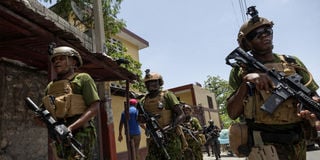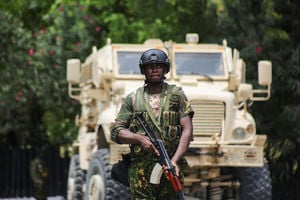
Haitian police officers and their Kenyan counterparts during a patrol in Port-au-Prince, Haiti June 28, 2024.
Families of Kenyan police officers deployed to Haiti have complained that they are yet to be paid since they started the peacekeeping mission in the Caribbean nation.
These revelations come two months after United States Secretary of State Antony Blinken ordered the release of $109 million (Sh14.1 billion) to finance the mission that was approved by the United Nations (UN).
The amount is also meant to purchase military equipment for the barracks in the capital Port-au-Prince, from where the Kenyan police are operating.
In multiple interviews, families of the police officers, who spoke in confidence for fear of being victimised, talked of financial strain due to the delayed pay.
Others lamented that with schools reopening today, they are unable to pay fees and buy items their children require for the third term, in which national examinations are to be administered.
“The schools are reopening and whenever I try to reach out to him, all I get is that we are yet to be paid,” said a wife.
She wondered what the husband was doing in Haiti yet they are unable to cater for their bills despite assurances that they will get additional payment.
A relative of another police officer said her children might not report to school unless the money is released.
“To be honest, we have a challenge here because even paying for meals and footing other bills has started becoming hectic,” said the relative.
The Nation confirmed the problem with some of the police officers in Haiti who, however, did not want to discuss the issue in details, instead referring us to their families in Kenya.
The first contingent of Kenyan police officers arrived in Haiti on June 25 after receiving the Kenyan flag the previous day from President William Ruto.
The second batch deployed on July 16, raising the number to 394 but still short of the pledged 1,000 troops. The officers are drawn from the General Service Unit, special units and Border Patrol Unit.
Contacted for comment about the disquiet, acting Inspector-General of Police Gilbert Masengeli said “the officers will get their payment in time”.
Foreign Affairs Principal Secretary Korir Sing’oei and Dr Monicah Juma, who is the president’s National Security Advisor, had not responded to our inquiries by the time of going to press.
This week, the Caribbean Community (Caricom) issued a statement stating that the mission is plagued by several challenges, including inadequate equipment, insufficient funding and delays in setting up governance institutions.
In meetings held between August 11 and August 16, including with Haiti Prime Minister Garry Conille, the team outlined the challenges faced by Haitian National Police (HNP) and the Kenyan forces.
“The common concern articulated was that the Kenyan force was both under-staffed and under-equipped and as a result lacked the capacity to hold reclaimed territory,” Caricom said in a statement as it lobbied for adequate funding for the mission.
“Delays in installing the critical institutions, the need for greater effectiveness in attaining the major objectives in the allotted time, and the corrosive impact of the allegations of corruption have contributed to the fragility of the transition process,” Caricom observed.
Mr Conille said the mission is in a race against time to restore peace and reclaim territory from armed gangs.
“For his part, the Prime Minister was acutely aware that the window of opportunity would not last long and that the people of the country expected delivery,” Caricom further stated.
The group added that Mr Conille cited the lack of resources and the breakdown of State institutions as impediments to the peacekeeping mission. But he added that efforts were underway to address the critical socio-economic and humanitarian issues facing the population.
The Caricom team also met the Director-General of the Haitian National Police, the minister responsible for women’s affairs, nominating sector leaders and leadership of political parties not represented in the government.
Others the team held talks with are civil society players including women’s and human rights associations, religious and private sectors, labour unions and a visiting diaspora group. It also met with representatives of Haiti’s major international partners (Canada, France and US) as well as the representatives of the UN Office in Haiti, the Organisation of American States and Mr Godfrey Otunge, the mission’s force commander.
Just a day after Caricom issued the statement, more equipment which include armoured personnel carriers (APC) were supplied.
An APC is a broad type of armoured military vehicle that is designed to transport personnel and equipment in combat zones.
In addition to the eight APC’s that were donated by the US, the French government added 24. The US on the same day added two more.
One of the armoured vehicles developed mechanical problems following an attack by gangs in Gauthier town. At the time of the ambush, the Kenyan contingent and the Haiti officers had battled the gangs that had taken over Road Two, which is the main route leading to the neighbouring Dominican Republic.
Apart from Kenya, other countries that will be sending troops to Haiti are Jamaica, Bahamas, Benin, Belize, Barbados, Antigua and Barbuda. Bangladesh, Algeria, France, Germany, Trinidad, Tobago, Turkey, United Kingdom and Spain will also send troops.
The Kenyan-led mission in Haiti was authorised by the UN Security Council in October 2023.
The Council called on the mission to establish an oversight mechanism to prevent human rights violations and to ensure conduct of operations in accordance with applicable international law.
On June 21, this year, a contract was signed in Washington DC in the US spelling out the rights and immunities granted to the forces deployed for the mission.
The deal stated that the officers are not subject to inspection on arrival and exemption from taxes on both their incomes and emoluments. The equipment the troops use is also exempted from tax required in Haiti as long as it is for official use.
If any officer commits any crime within Haiti, they can’t be prosecuted in the Caribbean nation but are referred to the mission for the necessary action.
Any officer who serves as the mission commander has the right to arrest members of his or her team for breaches of conduct and discipline in terms of policies and directives.









